
Mid-April, 1536
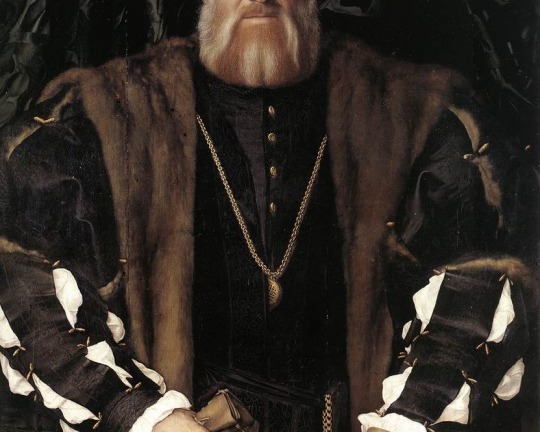 Ambassador Eustace Chapuys had been at court since 1529, and had witnessed most of Henry VIII’s efforts to rid himself of Katharine of Aragon and marry Anne Boleyn. Chapuys was unabashedly on Katharine’s side, and he despised Anne. His vicious, unsubstantiated gossip and snide insinuations about Anne have wound their way into history, since his ambassadorial reports make up the backbone of many of the era’s histories.
Ambassador Eustace Chapuys had been at court since 1529, and had witnessed most of Henry VIII’s efforts to rid himself of Katharine of Aragon and marry Anne Boleyn. Chapuys was unabashedly on Katharine’s side, and he despised Anne. His vicious, unsubstantiated gossip and snide insinuations about Anne have wound their way into history, since his ambassadorial reports make up the backbone of many of the era’s histories.As late as 1536, Chapuys had never actually spoken to Anne, or interacted with her in any way. He avoided any contact with her, though he spent a great deal of time in his letters obsessing over her activities.
In a letter to the Imperial court, dated April 21, Chapuys relates a strange set of incidents that occurred over the last month. At this point, he was unaware of the plot that was already underway, a plot that would end in Anne’s arrest and execution a little over a month later.
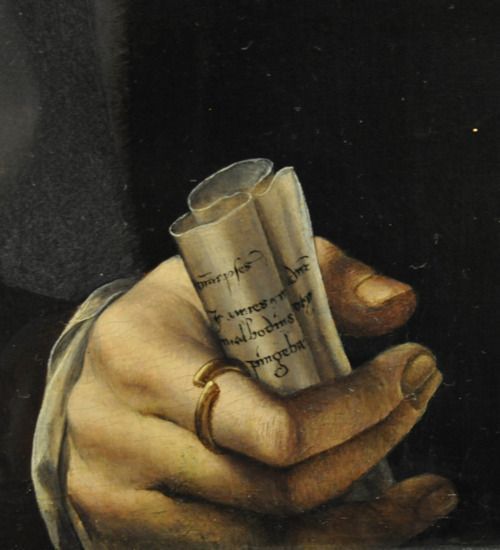 Chapuys met with Cromwell just after Easter to discuss the possibility of the King Henry reconciling with the pope, and the deteriorating situation in France. But more important to Chapuys - on a personal level - was the king’s reconciliation with his daughter, Mary, whom the king had treated with increasing cruelty for the girl’s refusal to accept herself as illegitimate and ineligible to inherit the throne.
Chapuys met with Cromwell just after Easter to discuss the possibility of the King Henry reconciling with the pope, and the deteriorating situation in France. But more important to Chapuys - on a personal level - was the king’s reconciliation with his daughter, Mary, whom the king had treated with increasing cruelty for the girl’s refusal to accept herself as illegitimate and ineligible to inherit the throne.Cromwell went out of his way to show respect to Chapuys and the emperor he represented, kissing the letters Chapuys had brought him. Cromwell assured him matters would be settled all parties’ satisfaction in time, and the king was merely waiting for the right opportunity to “express his affection” for the princess. Neither Henry, nor his council, had any regard for France, he said, and they had more esteem for the least hair on the Emperor’s head than they did for King Francis and all of his people. Laying it on a bit thick, Cromwell was.
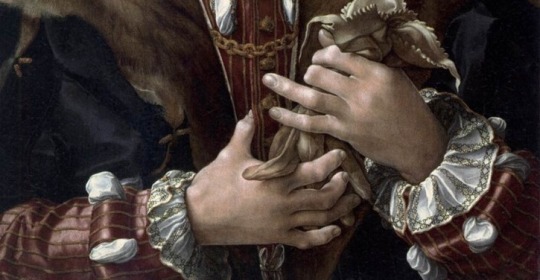
The following Tuesday, Chapuys was brought to meet with the king and his council, and it seems to have been quite the occasion for him. Chapuys describes the congratulations and laudatory comments made by the council members, praising him for the work he had done on the reconciliation with the Emperor. George Boleyn, Lord Rochford, was one of those who came to greet him. Chapuys reluctantly liked “the Concubine’s brother,” in spite of himself. George had the same charm and intelligence as his sister, and was an outgoing fellow. But Chapuys was irritated that George couldn’t refrain from “Lutheran discussions” of the reformed faith he so ardently supported.
Cromwell took Chapuys aside and said the king wanted him to go visit Anne and kiss her hand, something Chapuys had steadfastly avoided all of these years. The simple courtesy was an action fraught with political implications. If Chapuys bowed to Anne, he was acknowledging she was the Queen of England, and that meant Princess Mary was a bastard with no claim on the throne, a repudiation of the Emperor’s stance.
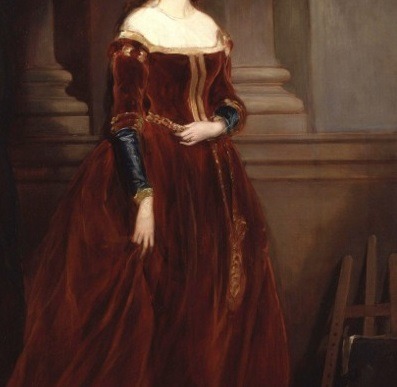 Chapuys tried to tactfully wriggle out of it, telling Cromwell it “wasn’t advisable” and begging him to give the king his apologetic excuses. Cromwell returned, saying the king had taken Chapuys’s refusal well enough and invited him to speak with the king after dinner. Chapuys must have breathed a sigh of relief. Diplomatic crisis averted.
Chapuys tried to tactfully wriggle out of it, telling Cromwell it “wasn’t advisable” and begging him to give the king his apologetic excuses. Cromwell returned, saying the king had taken Chapuys’s refusal well enough and invited him to speak with the king after dinner. Chapuys must have breathed a sigh of relief. Diplomatic crisis averted.The king showed Chapuys exaggerated courtesy, which should have had Chapuys’s “spidey sense” tingling. The two of them had experienced tense relations in the past, at one point descending into a screaming match over Henry’s treatment of Katharine and Princess Mary. But Henry was now distancing himself from the French (Anne’s allies) and trying to begin repairing relations with the Emperor. Soon the “sticking point” - Anne herself - would be gone, though Chapuys did not yet know that.

They had a brief conversation about what the Emperor was up to, and Henry said he hoped the Emperor would take his advice,
as that of a very old friend, good brother, and, as it were, a father, as he might understand by what I should tell him hereafter more at leisure. On this he said, Well, we should have leisure to discuss all matters.
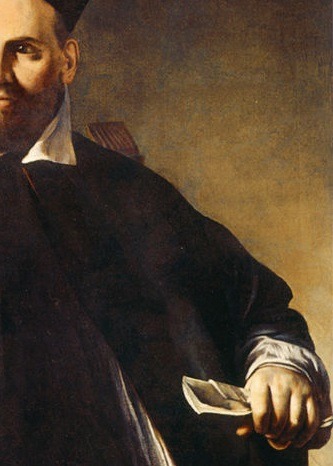 Chapuys would have another opportunity to speak to the king soon, but right now, Henry had something planned.
Chapuys would have another opportunity to speak to the king soon, but right now, Henry had something planned.George Boleyn came right on schedule to escort Chapuys to mass, but he didn’t lead him down the usual path. Instead, he steered him right toward where Anne Boleyn was walking. Chapuys notes that this was all a set-up in his description of the events, but he was really rendered helpless to prevent it by etiquette.
I was conducted to mass by lord Rochford, the concubine's brother, and when the King came to the offering there was a great concourse of people partly to see how the concubine and I behaved to each other. She was courteous enough, for when I was behind the door by which she entered, she returned, merely to do me reverence as I did to her. [...] I am told the concubine asked the King why I did not enter there as the other ambassadors did, and the King replied that it was not without good reason.Chapuys had bowed to Anne and acknowledged her as queen. By extension, the Emperor himself had just acknowledged Anne. Much like Anne’s meeting with Francis at Calais when he tacitly acknowledged her as Henry’s consort, Anne had just been given the Emperor’s acknowledgement, as well.
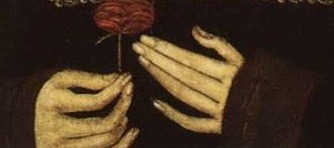
From her question to the king about why Chapuys had entered the way he did, it does not appear that Anne was in on this little plot. It should be noted, however, that she went out of her way to be polite to this man who had said so many hateful things about her, doubling back so that she could stop and bow to him. None would have blamed her if she had sailed right on past him without acknowledging his presence, but she made it a point to be courteous. He gave her the bare minimum of courtesy in return, a quick bow. He said not a word to her, nor offered to kiss her hand.
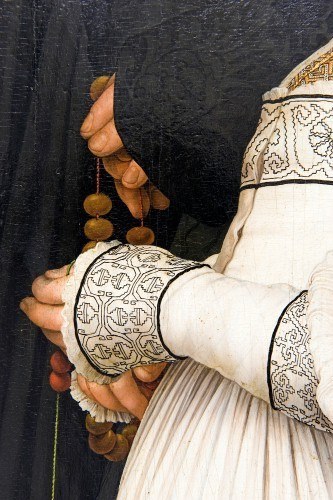 But the question is why this took place. Why did Henry feel the need to force this final little victory when he knew he would be killing her a month later? What petty thrill did he get from arranging this forced acknowledgement of the queen he would be so shortly disposing of?
But the question is why this took place. Why did Henry feel the need to force this final little victory when he knew he would be killing her a month later? What petty thrill did he get from arranging this forced acknowledgement of the queen he would be so shortly disposing of?Chapuys spoke again with the king a bit later, but despite the congenial way the events had begun, it soon descended into heated bickering. Chapuys made his Emperor’s points in conversation with the king and then excused himself.
After which they talked together, while I conversed and made some acquaintance with the brother of the young lady to whom the King is now attached [Jane Seymour], always keeping an eye upon the gestures of the King and those with him. There seemed to be some dispute and considerable anger, as I thought, between the King and Cromwell; and after a considerable time Cromwell grumbling left the conference in the window where the King was, excusing himself that he was so very thirsty that he was quite exhausted, as he really was with pure vexation, and sat down upon a coffer out of sight of the King, where he sent for something to drink.
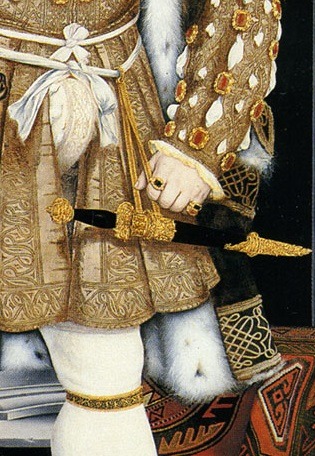 Cromwell spoke with Chapuys “confusedly and in anger” snapping out the king’s responses to Chapuys’s points, including the chilling remark that the Princess was Henry’s daughter and he would treat her as he saw fit and no one had the right to interfere.
Cromwell spoke with Chapuys “confusedly and in anger” snapping out the king’s responses to Chapuys’s points, including the chilling remark that the Princess was Henry’s daughter and he would treat her as he saw fit and no one had the right to interfere.Cromwell also let Chapuys know there were dark currents stirring under the surface that Chapuys didn’t yet know about.
[T]elling me also that although he had always pretended that what he said to me was of his own suggestion, yet he had neither said nor done anything without express command from the King. On my asking him what could have made this variation in the King's will, he said he could not imagine what spirit it was [...] and he concluded that princes have spirits or properties which are hidden and unknown to all others. By which conversations Cromwell showed covertly his dissatisfaction at the strange contradictions of his master. [...] [H]e told me that he who trusts in the word of princes, who say and unsay things, and promises himself anything from them, is not over wise, as he had found on Tuesday last[.]
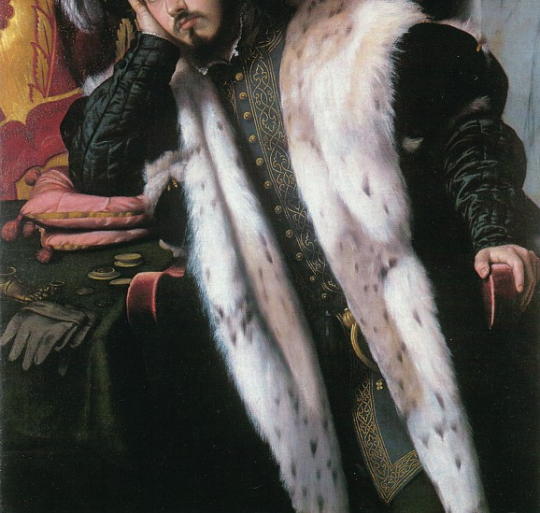 After a beginning in which he was so excited by the progress he thought had occurred and the honors done to him, Chapuys ended this letter in despair, and suggested the Emperor might want to throw himself in with the French and the pope, declaring Henry excommunicate and unfit to rule, and that Mary was the rightful ruler of England, enforcing this edict by military force. Perhaps the threat of a gathering army might bring Henry to his senses.
After a beginning in which he was so excited by the progress he thought had occurred and the honors done to him, Chapuys ended this letter in despair, and suggested the Emperor might want to throw himself in with the French and the pope, declaring Henry excommunicate and unfit to rule, and that Mary was the rightful ruler of England, enforcing this edict by military force. Perhaps the threat of a gathering army might bring Henry to his senses.Chapuys’s next letter begins with saying Cromwell has taken to his bed “in sorrow” over the matter and has retreated to his chambers. Cromwell wasn’t weeping into his pillow in anguish over the state of political turmoil - he was using his illness as a cover for the secret work he was doing in setting up the prosecution of Anne and her “lovers.”
Chapuys notes in his next letter that Princess Mary and her party were “jealous” over the fact Chapuys bowed to Anne, though he protests that he never kissed her hand, nor spoke to her.
Although I would not kiss or speak to the Concubine, the Princess and other good persons have been somewhat jealous at the mutual reverences required by politeness which were done at the church. I refused to visit her until I had spoken to the King. If I had seen any hope from the King's answer I would have offered not two but 100 candles to the shedevil, although another thing made me unwilling, viz., that I was told she was not in favor with the King; besides, Cromwell was quite of my opinion that I should do well to wait till I had spoken to the King.In light of the events shortly to come, Cromwell advising Chapuys to hold off on visiting Anne or giving her gifts is quite interesting. The king had made his point in regards to forcing the “acknowledgement.” No further courtesy to Anne was necessary.
One month from the time Chapuys was writing these words, Anne would be languishing in the Tower, and the swordsman of Calais would already be on his way.
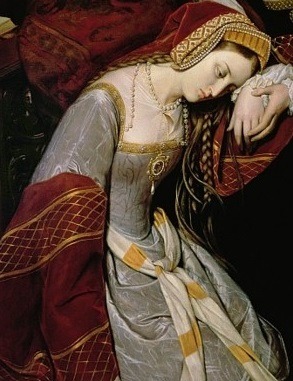
I don't accept this was Chapuys acknowledging Anne as Queen. He bowed out of politeness and as the King was passing also, his bow was towards Henry. Anne also nodded to him. It was not his intention to acknowledge Anne, but to be polite. Henry made much of this via propaganda.
ReplyDelete